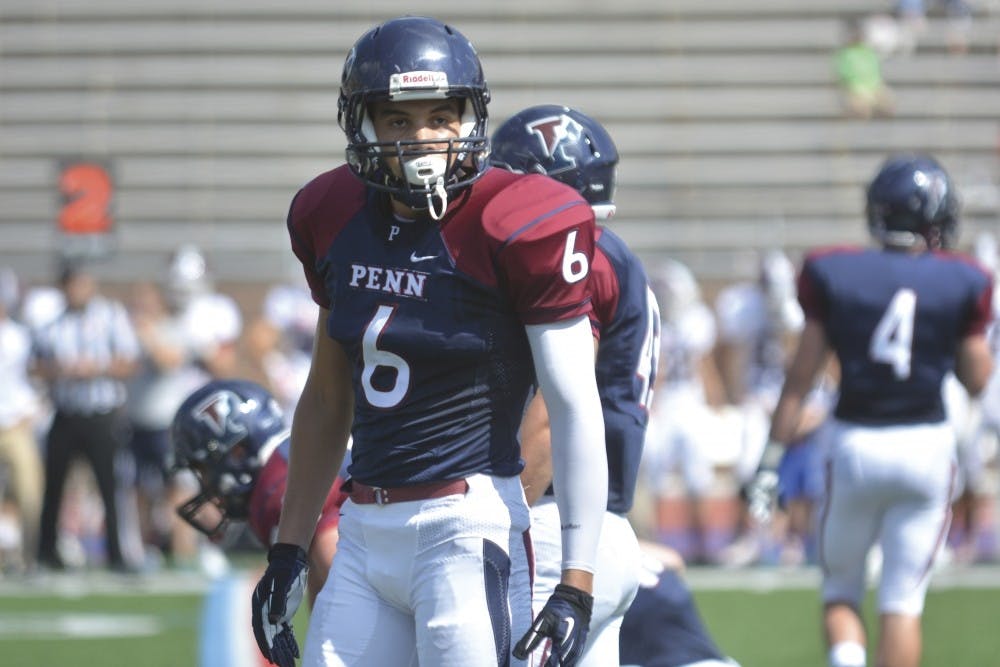
Standing at 6-foot-2, rising captain and wide receiver Marcus Jones is likely to strongly appreciate the Collegiate Sprint Football League's new weight limit of 178 pounds, one of several changes the CSFL is making in 2017.
Credit: Ilana WurmanPenn sprint football may still be celebrating its 2016 undefeated championship season, but defending its title will be a little different due to recent changes made by the Collegiate Sprint Football League (CSFL).
With the addition of Caldwell University, the CSFL will now be split into a North and South division. This change allows the CSFL to hold a championship game between the two division winners to determine the league champion. Before these changes, the league’s champion was determined only by the best regular season record.
“I really like that idea,” junior wide receiver and captain Marcus Jones said, “because it allows us actually to have a clear winner — like there’s no chance for a co-champion or anything like that, and I think it makes some games more important.”
For Penn to make the inaugural championship game, the Quakers will have to come out on top of a loaded South division. In addition to Navy, who has won a league-high 28 CSFL championships, Penn will also have to overcome Chestnut Hill, Mansfield and the newly-added Caldwell.
The league’s expansion means that Penn will not play Franklin Pierce in 2017, but the Red and Blue will still have regular season games against Army, Cornell and Post, who make up all the other teams in the four-team North division.
The new championship game will also mean that the two teams taking part will have most likely already met earlier in the regular season.
“And we’re using that kind of as motivation now,” Jones said, “just to get ready, because I know we play Army once and then we can look at them and have a little bit of a better idea of what they’re going to be doing for when we play them in the championship game too.”
In addition to the championship game, next season will also feature a weight-increase for players. Up until this past season, players could not weigh in at more than 172 pounds. This year, that limit will be raised to 178.
With players only having to make weight at one weigh-in scheduled for four days before every game, expect some players to be competing at weights several pounds heavier than 178.
And while the weight-increase has been welcomed by players seeking extra flexibility, any sport involving weight-limits always requires extra precautions.
“Anytime there is a weight consideration, we really like to make sure that any kind of changes in weight or making weight are done in a really safe way and a healthful way,” Penn sports nutritionist Jill Joseph said. “I try to educate them well before they ever have to start really making weight and talk about healthy practices, so that we’re within a certain range before that weigh-in.”
On top of the many important health and safety considerations, the weight change will likely affect gameplay and strategy as well. Though all players who struggled to make the previous 172-pound limit may benefit from the change, the style of play in the trenches may be particularly impacted by the groundbreaking move.
And while it remains to be seen just how much the weight-increase will affect the game, the Quakers are hoping that it might help recruit some new players too.
“178 is a big difference from 172, and we just wanted to let people know that we’re always welcoming new prospective players,” Jones said. “We just hope that the weight change and the fact that we brought a championship to Penn would make things more interesting to students.”
It’s anybody’s guess if these changes will help make sprint football more popular on campus, but change or no change, the Red and Blue will be hungry to defend their title in new ways come September.
The Daily Pennsylvanian is an independent, student-run newspaper. Please consider making a donation to support the coverage that shapes the University. Your generosity ensures a future of strong journalism at Penn.
Donate






